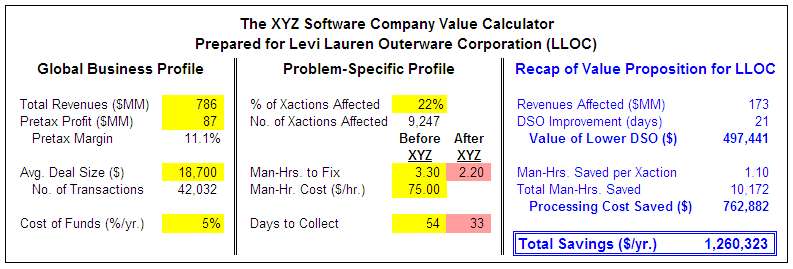Using a "Value Calculator" to Sell Your Products -- Part I
Dec 9, 2010
NOTE: This piece was originally posted on the 121 Silicon Valley, Inc. Website on December 9, 2010
We all understand how critical your finance team can be in helping you negotiate and close your deals, but they can often be a huge help even earlier – in the sales process itself, by helping you make the best possible presentation of your products’ value proposition.
Consider the example below – the XYZ Software Company sells an add-in solution for an enterprise’s ERP system, to address situations when a single order has to be fulfilled in multiple shipments. When that happens, the enterprise’s own end customers question the invoice, causing the enterprise to have to devote man-hours to documenting and supporting a perfectly valid receivable, and delaying collections. XYZ’s ERP add-in can help solve this problem.
This is the kind of problem where it’s easy to quantify the financial benefits, so the XYZ sales force has worked with the finance team to develop a powerful, concise, and clear “value calculator,” which can be delivered to prospects in a short handout, or dropped right into a PowerPoint presentation. Here’s what it looks like for one particular prospect, the Levi Lauren Outerware Corporation (LLOC):

The left-hand column provides a summary of the prospect’s overall business, and the middle column recaps the information specific to the problem that XYZ Software addresses. In particular for LLOC, the problem – orders requiring multiple shipments to fulfill – afflicts 22% of their sales transactions. The XYZ solution will reduce LLOC’s staff effort from an average of 3.30 to 2.20 man-hours for each of these transactions, and will shorten average collection time from 54 days to 33 days. The right-hand column recaps the financial benefits for LLOC, and shows that the XYZ Software solution can provide a hard-dollar profit improvement of $1.3MM per year!
The “value calculator” has a number of powerful sales characteristics:
It’s rare for people in the sales team to have either the spreadsheet skill or the time available to deliver a clean, effective value proposition model. That’s especially true when the quantifiable benefits are a little less obvious or harder to characterize than they are in this example. But people in the finance and accounting area will have those skills, and will almost always be delighted to be asked to help in the sales process. A model like this – especially if it can be standardized for the entire sales force – can be a powerful weapon in your sales collateral arsenal.
In my next post we’ll go into more detail about the design characteristics that will make a “value calculator” like this especially effective.
We all understand how critical your finance team can be in helping you negotiate and close your deals, but they can often be a huge help even earlier – in the sales process itself, by helping you make the best possible presentation of your products’ value proposition.
Consider the example below – the XYZ Software Company sells an add-in solution for an enterprise’s ERP system, to address situations when a single order has to be fulfilled in multiple shipments. When that happens, the enterprise’s own end customers question the invoice, causing the enterprise to have to devote man-hours to documenting and supporting a perfectly valid receivable, and delaying collections. XYZ’s ERP add-in can help solve this problem.
This is the kind of problem where it’s easy to quantify the financial benefits, so the XYZ sales force has worked with the finance team to develop a powerful, concise, and clear “value calculator,” which can be delivered to prospects in a short handout, or dropped right into a PowerPoint presentation. Here’s what it looks like for one particular prospect, the Levi Lauren Outerware Corporation (LLOC):

The left-hand column provides a summary of the prospect’s overall business, and the middle column recaps the information specific to the problem that XYZ Software addresses. In particular for LLOC, the problem – orders requiring multiple shipments to fulfill – afflicts 22% of their sales transactions. The XYZ solution will reduce LLOC’s staff effort from an average of 3.30 to 2.20 man-hours for each of these transactions, and will shorten average collection time from 54 days to 33 days. The right-hand column recaps the financial benefits for LLOC, and shows that the XYZ Software solution can provide a hard-dollar profit improvement of $1.3MM per year!
The “value calculator” has a number of powerful sales characteristics:
- XYZ Software’s value proposition is presented clearly and in real, honest-to-God dollars.
- The value proposition is presented in terms meaningful to senior management, and in particular to a CFO, who is very likely to be a key player in the buying decision.
- The presentation of the model shows that the XYZ sales force considered and researched LLOC’s particular issues and needs.
It’s rare for people in the sales team to have either the spreadsheet skill or the time available to deliver a clean, effective value proposition model. That’s especially true when the quantifiable benefits are a little less obvious or harder to characterize than they are in this example. But people in the finance and accounting area will have those skills, and will almost always be delighted to be asked to help in the sales process. A model like this – especially if it can be standardized for the entire sales force – can be a powerful weapon in your sales collateral arsenal.
In my next post we’ll go into more detail about the design characteristics that will make a “value calculator” like this especially effective.
Related Blogs
Other Topics
Other Topics


